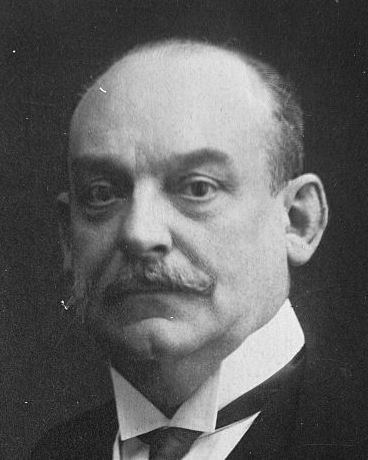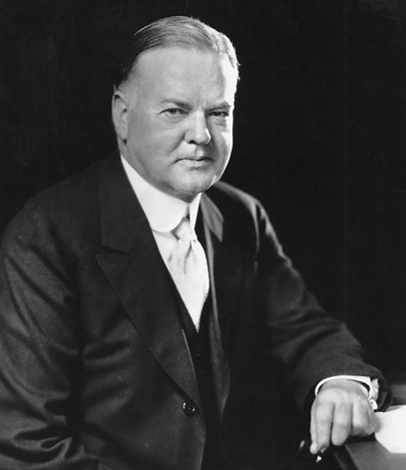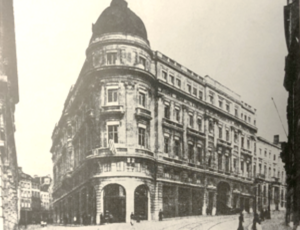History
Emile Francqui and the creation of the Francqui Foundation

Emile Francqui, born on June 25, 1863, in Brussels, was a visionary philanthropist and Belgian statesman. His life was characterized by significant contributions to his country, a deep commitment to international cooperation, and a dedication to the common good through his support to education and science.
Early life
Tragedy struck at a tender age when Emile Francqui suffered the loss of his mother. The weight of responsibility then fell upon his father, who, in his pursuit of providing for the family, separated Emile from two out of three of his siblings. He entrusted Emile and his younger brother into the care of their grandmother. This early familial upheaval forced Emile to confront responsibilities of adulthood well before his peers, a circumstance that would indelibly shape his character in the years to come.
When the grandmother passed away, Emile was only forteen years old. He then entered the prestigious Royal Military Academy in Brussels where he showed a lot of ambition, and a strong interest in science and exploration. His military career would last 18 years.
Military man in Congo
When the « Independent State of Congo » was founded, his first sovereign, King Leopold II, recruited young officers to organize his new state. Emile Francqui was one of them. In the beginning he was assigned to the Military Cartography Institute. After climbing up the ranks, the young ambitous man took part in major development projects, including the construction of railroads and other infrastructure. He also took part in the anti-slavery campaign and explored the great Katanga region.
Diplomate in China
King Leopold II had astutely recognized his talents: he personally requested that Francqui be dispatched to China as consul, to negotiate an agreement entrusting a Belgian company with the task of constructing the significant Beijing-Hankou railway network. Francqui arrived there in 1897, and stayed until 1902. As part of this mission, his most important business rival was Herbert Hoover, who later became president of the United States.
Businessman during the First World War
When the First World War erupted in 1914, Emile Francqui was back in Belgium, where he became the Director of the « Société Générale de Belgique » and of the « Bank of Outremer ». The Belgian population was threatened with famine after the occupation of the majority of the  territory by the German armed forces. The American public opinion took care of the fate of our people : a large-scale expression of generosity arose under the name « Commission for Relief of Belgium (CRB) ». Its Chairman was Herbert Hoover. Funds that were collected in Belgium and in different countries, including the United States, were used to transport food to Belgium through the Netherlands, which had remained neutral in the conflict.
territory by the German armed forces. The American public opinion took care of the fate of our people : a large-scale expression of generosity arose under the name « Commission for Relief of Belgium (CRB) ». Its Chairman was Herbert Hoover. Funds that were collected in Belgium and in different countries, including the United States, were used to transport food to Belgium through the Netherlands, which had remained neutral in the conflict.
In search of a strong partner in Belgium, Herbert Hoover remembered Emile Francqui, who was a formidable competitor during the discussions in China. A partnership was established and Francqui organized on our territory the National Committee for Aid and Food, responsible for receiving food from America, and distributing it to the population. Francqui’s leadership was characterized by resourcefulness, strategic thinking, and unwavering dedication to his country. Beyond their professional collaboration, Hoover and Francqui shared a deep personal friendship. Their mutual respect and admiration for each other’s abilities were evident in their correspondence and interactions.

Building of the Belgian Bank for Lands Abroad, on Rue des Colonies, Brussels,
where the offices of the CRB were located.
Philanthropist during Belgium’s reconstruction
And the creation of the Francqui Foundation
As a visionary leader, Emile Francqui played an essential role in shaping Belgium’s economic landscape during a critical period in its history. The National Committee for Aid and Food functioned until the end of the war. At that time, Emile Francqui and the Commission for Relief of Belgium headed a major capital. He and Herbert Hoover decided to dedicate it in the first place to the reconstruction of Belgium. In their opinion, the best investment was to do this at university level. For example, more than half of this capital was reserved for Belgian universities. Later the University Foundation was founded in Brussels (in 1920), the Belgian American Educational Foundation (BAEF) in New York, and then – at the initiative of King Albert I – the National Fund for Scientific Research (in 1928), of which Francqui used to be the driving force behind it.
The University Foundation had important resources that would allow young Belgians to undertake university studies, even if they were not well funded. The National Fund for Scientific Research received a financial contribution, intended to support scientific research.
Later Emile Francqui was called upon by Prince Leopold, the future King Leopold III, to take an initiative for the benefit of the people of Belgian Congo. This led to the foundation of the Prince Leopold Institute of Tropical Medicine (1931). Emile Francqui was the first Chairman of the Board of Directors of that Institute and obtained an important financial support from the BAEF to start it up.
To promote the development of higher education and scientific research in Belgium and to compliment the responsibilities of the University Foundation and the National Fund for Scientific Research, Francqui and Hoover jointly decided to set up a new Foundation. The Francqui Foundation was formally established as a Institution of Public Utility by Royal Decree on February 25, 1932. Herbert Hoover was insistent that the Foundation bears the name of Emile Francqui, an enduring tribute to a man who had made significant contributions to both his country and the realm of science.
Later life and legacy
At the end of his career, Emile Francqui was Delegate Director of the « Union Minière du Haut Katanga » and also Governor of the « Société Générale de Belgique ». Although he became several times Minister in his life, he finally appointd appointed Minister of State in 1934.
Emile Francqui died on November 18, 1935.
Today his legacy endures in various forms. It is a testament to the power of vision, dedication, and philanthropy.
Although its fundamental mission remains constant, the Francqui Foundation has evolved over time to meet the continually changing demands of the academic landscape and scientific research. Here are some of the most significant changes the Foundation has made to adapt and thrive in the contemporary world: more internationalization and interuniversity collaboration, the expansion of activities and the number of mandates, the value increase of the Prize and honoraria, and the enhanced support for young researchers. These changes reflect the Foundation’s commitment to remain relevant and effective.